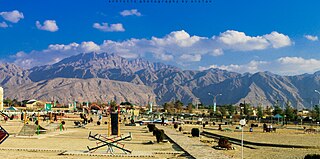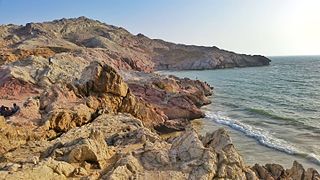Related Research Articles

The Baloch or Baluch are a nomadic, pastoral, ethnic group which speaks the Western Iranic Baloch language and is native to the Balochistan region of South and Western Asia, encompassing the countries of Pakistan, Iran, and Afghanistan. There are also Baloch diaspora communities in neighbouring regions, including in Central Asia, and the Arabian Peninsula.

Quetta is the capital and largest city of the Pakistani province of Balochistan. It is the tenth largest city in Pakistan, with a population of over 1.6 million. It is situated in the south-west of the country, lying in a valley surrounded by mountains on all sides. Quetta is at an average elevation of 1,680 metres above sea level, making it Pakistan's highest altitude major city. The city is known as the "Fruit Garden of Pakistan" due to the numerous fruit orchards in and around it and the large variety of fresh and dried fruits produced there.

Pakistan is a multilingual country with over 70 languages spoken as first languages. The majority of Pakistan's languages belong to the Indo-Iranian group of the Indo-European language family.

Barkhan is a district in the province of Balochistan in Pakistan. It shares its borders with the province of Punjab to the east and the Balochistan districts of Dera Bugti to the south, Kohlu to the west, Loralai to the northwest and Musakhel to the north. The town of Barkhan serves as the district's headquarters. It was granted the status of a separate district on 31 December 1991, prior to which it was a tehsil within Loralai District.

Sibi is a district in the Balochistan province of Pakistan. The main mountain ranges are Zen, Bambore and Dungan. The climate and topography of Sibi District is quite varied compared to the other districts of Balochistan. It is also known as the "hotspot" of Pakistan where the temperatures in the summer has exceeded 52.6 °C (126.7 °F). Until 2013 the district had two sub-divisions, Sibi and Lehri, further organized into Tehsils and sub-tehsils: Sibi, Lehri, Kutmandi and Sangan. Lehri was rejoined with Sibi district in 2018.

Turbat is a city in southern Balochistan, Pakistan. It is the administrative centre of Kech District. Situated on the bank of the Kech River, Turbat was the historical capital of the State of Makran. Turbat is the second-largest city in Balochistan after Quetta and the 38th largest city of Pakistan. It is the largest city in the southern part of the province. The Gwadar Port lies 180 kilometres (110 mi) southwest of Turbat.
Sibi is a city situated in the Balochistan province of Pakistan. The city serves as the administrative headquarters of the district and tehsil of the same name.
Mengal are a Brahui speaking clan in Balochistan, Pakistan. Mengal was originally one of the four Jat (Jadgal) tribes inhabiting Balochistan; the other three being Zehri, Bizenjo and Sajdi.

The Talpur dynasty were rulers based in Sindh, a region of present-day Pakistan. Four branches of the dynasty were established following the defeat of the Kalhora dynasty at the Battle of Halani in 1783: one ruled lower Sindh from the city of Hyderabad, another ruled over upper Sindh from the city of Khairpur, a third ruled around the eastern city of Mirpur Khas, and a fourth was based in Tando Muhammad Khan.

Balochistan, also spelled Baluchistan or Baluchestan, is a historical region in Western and South Asia, located in the Iranian plateau's far southeast and bordering the Indian Plate and the Arabian Sea coastline. This arid region of desert and mountains is primarily populated by ethnic Baloch people.

Hub District, is a coastal administrative district of Balochistan Province of Pakistan. The district was created after bifurcation of Lasbela District in 2022.
Pakistani clothing refers to the ethnic clothing that is typically worn by people in the country of Pakistan and by Pakistanis. Pakistani clothes express the culture of Pakistan, the demographics of Pakistan, and cultures from Punjab, Sindh, Balochistan, Khyber Pakhtunkhwa, Gilgit-Baltistan, and Kashmir regions of the country. The clothing in each region and culture of Pakistan reflect weather conditions, way of living, the textiles and embroidery used and its distinctive style which gives it a unique identity among all cultures.

Khetrānī, or Khetranki, is an Indo-Aryan language of north-eastern Balochistan. It is spoken by the majority of the Khetrans, an ethnolinguistic tribe that occupies a hilly tract in the Sulaiman Mountains comprising the whole of Barkhan District as well as small parts of neighbouring Kohlu District to the south-west, and Musakhel District to the north. Alternative names for the language attested at the start of the 20th century are Barāzai and Jāfaraki.
The Balochs of Sindh,, is a community of Sindhi-speaking Baloch tribes living throughout the Sindh province of Pakistan.

The Baloch diaspora refers to Baloch people, and their descendants, who have immigrated to places outside the Balochistan region of South-West Asia – a region stretching from southwestern Pakistan to southeastern Iran and southern Afghanistan. The Baloch diaspora is found throughout the Middle East, South Asia, Turkmenistan, East Africa, Europe, North America and in other parts of the world.

Gul Khan Naseer also known as Malek o-Sho'arā Balochistan ; 14 May 1914 – 6 December 1983) was a Pakistani politician, poet, historian, and journalist from Balochistan. Most of his work is in Balochi language, but he also wrote in English, Urdu, Brahui and Persian.

Pakistan is an ethnically and linguistically diverse country. The major Pakistani ethnolinguistic groups include Punjabis, Pashtuns, Sindhis, Gujjar, Saraikis, Muhajirs, Balochs, Paharis and Brahuis, with significant numbers of Baltis, Kashmiris, Chitralis, Shina, Kohistanis, Torwalis, Hazaras, Burusho, Wakhis, Kalash, Siddis, Uzbeks, Nuristanis, Pamiris, Hindkowans, Kyrgyz, Turkmen, Uyghurs and other various minorities.

Jokhio is a Sindhi Sammat tribe found in Sindh, Pakistan. The Jokhio were considered a powerful tribe and held great political importance in the British Raj Sindh and were granted Jagir by the Raj Government. The Jokhio tribe is also notable for Chaukhandi tombs, a centuries-old monument known for its sandstone carvings.
The Jadgal is an Indo-Aryan ethno-linguistic group which speaks the Jadgali language. Jadgals are present in the Balochistan region of Iran and Pakistan, as well as in Oman.
References
- ↑ Khair Mohammad Buriro Sewhani (2005). ذاتين جي انسائيڪلوپيڊيا (in Sindhi). p. 306.